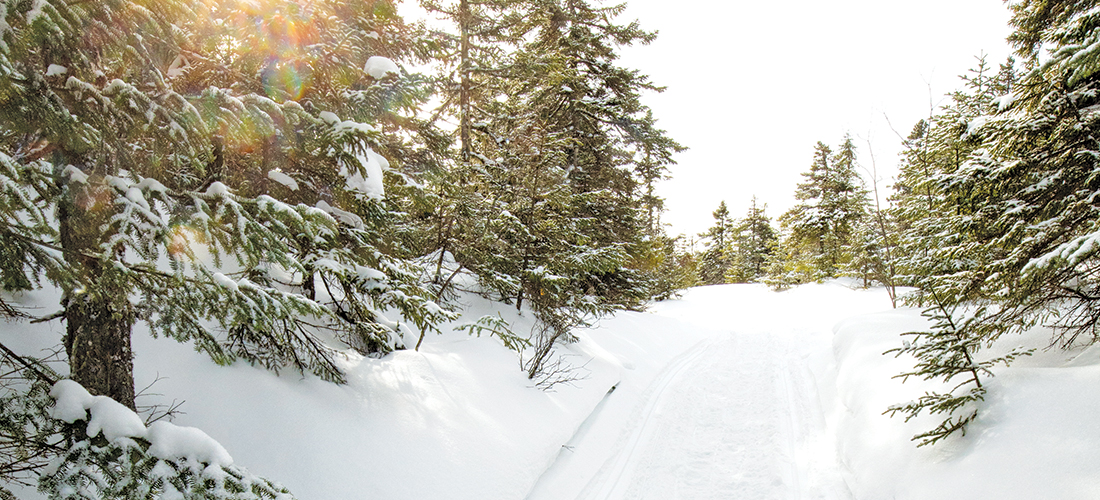
The Winter Gardener
There’s plenty of life stirring beneath the season’s snows
By Jim Dodson
As you read this, the first winter of the new decade is drawing to a close.
Like a certain fabled snowman who danced with the village children until he began to melt away, I rather hate to see it go.
Winter, you see, is my favorite gardening season.
Perhaps this is because I am a son of winter, reportedly born during the height of a February snowstorm on Groundhog Day way back in 1953.
Or maybe my wintry affection stems from two decades of living on a forested hill in Maine, where the snow piled up before Christmas and I learned most of what I know about resourceful living and “making do” — as they say in the North Country — including the art of keeping the home fires burning and loved ones warm.
The light of winter is another of the season’s charms. Clear winter stars over our hilltop provided a dazzling show of celestial beauty, and the feel of the winter sun on your face on a cold, clear afternoon is like a benediction in Nature’s chapel.
Whenever I’m having difficulty falling asleep, I remember cold clear nights when I donned my red wool Elmer Fudd coat and toted a 50-pound bag of sorghum pellets to the spot at the forest’s edge. There, a family of whitetail deer waited patiently for their supper in the arctic moonlight during the hardest nights of year — a memory of fellowship with mythic creatures that never fails to ease me into sleep on my own winter nights.
It’s possible that my fondness for what poet Christina Rossetti called the “bleak midwinter” is simply written in the stars. Both my parents were Aquarians with midwinter birthdays just days before my own in early February. Ditto my firstborn child, a beautiful baby girl who appeared during a January blizzard that left the world quilted in white as the golden morning sun spread over Casco Bay, moments after young Maggie’s debut.
When we carried her home to Bailey Island, our unplowed lane lay so deep in snow we were forced to park at the village post office and slide down a steep hill to our back door just steps from the cobalt blue sea. The memory of my newly arrived Southern mother giddily whooping as she tobogganed down the hill on her bottom still makes me smile. Maggie made the trip all bundled into my arms — and claims to remember the journey to this day.
Winter’s other gifts included our annual winter solstice party where friends and neighbors came out of the frigid night to sing and dance for their supper and — because I married into a clan of real Glaswegian Scots — a Hogmanay celebration on New Year’s Eve that included dancing to fiddle reels and toasting with good Islay-made Scotch with Big Ben dialed up on the shortwave radio at 7 p.m. — and sing in bed by nine. The drunks in Times Square could never compete with that.
To some extent or another, of course, every one of these seasonable pleasures can be found in North Carolina winter as well, including cold nights, clear stars, holiday lights, good Scotch and fiddle reels and — despite global warming — the occasional surprise snowfall that stops a madding world in its tracks.
But winter here has one significant advantage over life on a snowy hilltop in Maine.
In the North Country, once the deep cold and snows arrived, I could only tend the fire, browse seed catalogs and picture the ambitious things I planned to do in my garden once the frozen ground thawed and was fully in view again — generally around Easter time, if we were lucky.
Thanks to kinder and gentler Southern winters, however, I am able to get to work planning and digging even before Hogmanay arrives. With Nature at parade rest and stripped to bare essentials, I not only can see the architecture of my garden, but also take stock of last summer’s botanical successes and bonehead miscues.
This year, for example, with the new decade just hours away, I spent five blessedly solitary hours getting gloriously dirty in my winter garden on New Year’s Eve. To briefly review my loves’ labors, I dug up and transplanted seven rose bushes and nine ornamental grasses; moved a mophead hydrangea to a shadier spot and six Russian sages to a sunnier one. I also planted a splendid Leland cypress, raked up the last of the autumn leaves and spread a dozen wheelbarrows worth of new hardwood mulch.
By the time I was finished — and the work finished me — the mistress of the estate required me to strip bare at the side door before entering her gleaming New Year’s kitchen, though she’ll flatly tell you that she never sees me happier than after a few well-spent hours digging in my winter garden, headed for a good soak in the tub or a hot shower.
Dig in the soil, goes the old gardener’s ditty — delve in the soul.
Even William Shakespeare seemed to find this time of year irresistible for contemplation of life’s passing seasons.
That time of year thou mayst in me behold
When yellow leaves, or none, or few, do hang
Upon those boughs which shake against the cold,
Bare ruined choirs, where late the sweet birds sang.
In me thou see’st the twilight of such day
As after sunset fadeth in the west;
Which by and by black night doth take away,
Death’s second self, that seals up all in rest.
In me thou see’st the glowing of such fire,
That on the ashes of his youth doth lie,
As the death-bed, whereon it must expire,
Consumed with that which it was nourish’d by.
This thou perceiv’st, which makes thy love more strong,
To love that well, which thou must leave ere long.
His theme, of course, is the brevity of life.
As February dawns, such wintry thoughts come naturally to my mind as well, for I reach my mid-60s this year and am both amused and astonished how quickly the notion of “old age” has arrived.
Save for a pair of dodgy knees that make gardening’s up and down a bit more challenging, I honestly don’t feel a day over 40 — yet I know I’m in the midwinter of my allotted visitation time, with scarce time to waste for being present in my own days, whatever the season.
“Tho’ I am an old man,” as Founding Father Thomas Jefferson wrote to his friend Thomas Willson Peale in August of 1811, “I am but a young gardener.”
Two and one-half decades ago, when I really was in my 40s, I spent the entire month of February by my own founding father’s bedside, serving as his caretaker as he slipped the bonds of Earth.
What a fine and joyful life he’d led — my nickname for him was “Opti the Mystic” — and what a privilege it was to simply sit by his bed talking about this and that, weather and wives, golf and grandchildren, nothing left unsaid, saying thank-you as his life gently ebbed away.
The end came a few days into March, after a night of sleet gave way to a stunning spring morning full of sunshine and birdsong.
My oldest friend Patrick turned up, seemingly unbidden, suggesting we go play the old goat farm golf course where we learned to play as kids.
I have no memory of how we scored or even what we talked about, though it was the perfect thing to do. Opti would surely have approved.
That afternoon, I dug up some of my mom’s peonies to take home to my snowbound perennial beds in Maine.
I planted them as the spring thaw finally arrived — sometime around Easter. OH
Contact Editor Jim Dodson at jim@thepilot.com.





